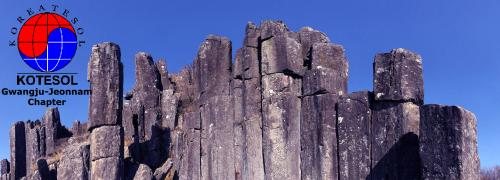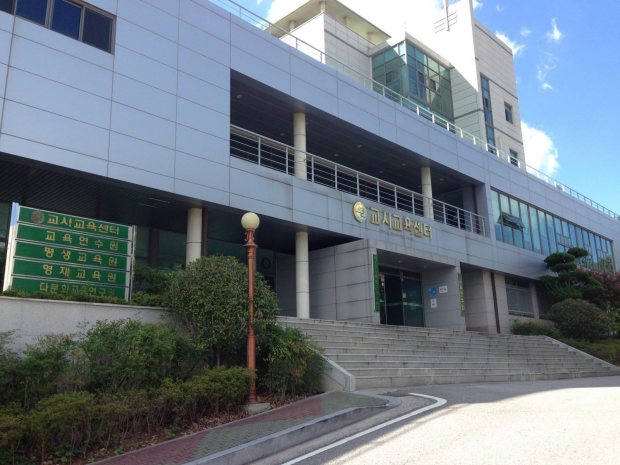
Gwangju-Jeonnam Chapter December Meeting
.
----- Morning Reflective Practice Session -----
Topic: Transitioning from Reflective to Critically Reflective Teaching
Session Facilitator: Jocelyn Wright
Time: 11:00 am - 12:30 pm
NEW Location: Aldersgate (올더스게이트), cozy cafe near GNUE. Ground floor of 광주우리교회 Building.
----- Main Meeting Schedule -----
Time: Saturday, December 12, 2015, 1:45 - 5:00 pm
NEW Location: Gwangju National University of Education (GNUE), Teacher Training Center (교사교육센터) 1st Floor; Room 811. Detailed directions HERE.
1:45 pm: Sign-in and Meet-and-Greet (Admission is free. Future membership is welcomed.)
2:00 - 2:50 pm: Presentation 1
Short Stories and L2 Learners
Tyson Vieira (Kyungnam University, Changwon)
2:50 - 3:10 pm: Refreshment Break
3:10 - 4:00 pm: Presentation 2
The False Hope in the Transitive Property of Equality in EFL
Kevin Dieter (Gwangju Health University)
4:10 - 5:00 pm: Swap-Shop Presentations
Share your Teaching Ideas, Classroom Activities, and Teaching Wisdom with the group.
(Everyone is encouraged to share. Short tidbits are welcomed. Handouts also welcomed.)
5:00 pm: Announcements / Drawing for Door Prizes / Closing
5:30 - 8:00 pm: Year-End Holiday Dinner
.
Venue: GNUE - Gwangju National University of Education (Room 814; 1st Floor)
Dinner Menu: Roasted Turkey, Stuffing, Mashed Potatoes & Gravy, Cranberry Sauce ...
Registration & Fees: HERE
Further Details: HERE

Photo credit: "Carving turkey-02" by Dinner Series - Carving Set by Match Pewter auf flickr. Licensed under CC BY 2.0 via Wikimedia Commons.
Presentation Synopses and Presenter Bio-Sketches
.
Short Stories and L2 Learners
Tyson Vieira
In English conversation courses, instructors would likely never consider teaching literature. However, the effectiveness of a tool or technique depends on how the teacher uses it. A literature project, for instance, can be used as a student-centered, interactive experience in conversation courses. In order for this activity to be successful, teachers need to introduce the literature enthusiastically and systematically. As language instructors, our role is to guide students along a path towards autonomous learning and self-discovery. Literature can be a tool leading to that goal.
In Professor Linda Gajdusek’s 1988 article, “Toward Wider Use of Literature in ESL: Why and How,” she explains a technique which divides the classroom literature experience into four steps: pre-reading activities (background information and vocabulary), factual in-class work (answering who, where, and when), analysis (aspects of structure, the why’s, theme, and style), and extending activities (highlighting the ideas and situations found within the text). This step-by-step process can be greatly successful, but time constraints and institutional policies could affect the implementation of this detailed, step-by-step process.
Through a variety of activities, teachers can help guide their students to a path of autonomous learning and self-discovery. The spectrum of activities is massive; however, each activity should be a part of the larger picture. Gajdusek advises, “Unless we structure the classroom experience so as to make the students discover what is there, we are not really teaching literature – or anything – in ESL” (p. 254). If teachers introduce English literature enthusiastically and systematically, our students will be able to take a written story and create a new interactive experience in the classroom.
The collaborative workshop will focus mainly on Gajdusek’s four-step literature process and how we, as teachers, can apply it to our classroom. First, we will discuss briefly the positives, the possible negatives and challenges with applying literature experiences to our students. A handout with reflective questions and an individual exercise will be given to each workshop attendee. The handout will also contain a short story in which we will break into small groups to discuss the story’s application, student level and activities. After small group work is finished, they will present it to the whole class for further analysis and discussion.
Reference
Gajdusek, L. (1988). Toward wider use of literature in ESL: Why and how. TESOL Quarterly, 22(2), 227–257.
The Presenter
 Tyson Vieira works at Kyungnam University as an English assistant professor. For three years, he worked for the Jeollanamdo Language Program (JLP) under the Provincial Office of Education. Prior to that position as a teacher at Muan Englishtown, Tyson taught for two years at five different elementary schools in Haenam. He earned his MA degree in TESOL from Azusa Pacific University in California. He was involved with the National English Ability Test (NEAT) as an item writer and various JLP projects such as coordinating the Jeollanamdo Provincial English Camps and teaching in JLP’s distant learning program. He is a current member of the Gwangju-Jeonnam Chapter, and served as the co-facilitator of the local Reflective Practice Special Interest Group and as a chapter officer. He has written articles for JLP’s Bibimbap and for Gwangju News.
Tyson Vieira works at Kyungnam University as an English assistant professor. For three years, he worked for the Jeollanamdo Language Program (JLP) under the Provincial Office of Education. Prior to that position as a teacher at Muan Englishtown, Tyson taught for two years at five different elementary schools in Haenam. He earned his MA degree in TESOL from Azusa Pacific University in California. He was involved with the National English Ability Test (NEAT) as an item writer and various JLP projects such as coordinating the Jeollanamdo Provincial English Camps and teaching in JLP’s distant learning program. He is a current member of the Gwangju-Jeonnam Chapter, and served as the co-facilitator of the local Reflective Practice Special Interest Group and as a chapter officer. He has written articles for JLP’s Bibimbap and for Gwangju News.
_______________
The False Hope in the Transitive Property of Equality in EFL
Kevin Dieter
This presentation is designed to discuss whether a new approach to EFL is needed. Current approaches to EFL education include traditional approaches and communicative approaches. Both sets of approaches for EFL education are flawed in principle.
Traditional approaches to EFL education focus on building student skills from word to sentence following the rules of grammar for a systematic learning process. Advanced practice tends to focus on Korean to English or English to Korean translation. Communicative approaches to EFL education focus on authentic content and realistic opportunities for more naturalistic acquisition process. Advanced practices tend to focus on student to student interaction.
Neither set of approaches address the absence of the transitive property of equality in EFL, thus allowing EFL students to continue their EFL education efforts based on a flawed principle. Therefore, it is argued that a new approach to EFL should be considered. This new approach should raise the level of consciousness of students regarding communication and emphasize communicative skills that best compensate their EFL deficiencies.
The transitive property of equality states that if a = b and b = c, then a = c. In an EFL context "a" is defined as the intentionality of the sender; "b" is defined as the EFL learner’s L1 representation of his own intentionality; and finally, "c" is defined as the EFL learner’s target language representation of that same intentionality. It is my argument that the approaches described above are based on the false premise that the transitive property of equality exists in EFL education and this misrepresentation needs to be exposed, its perpetuation ended, and more accurate approaches to EFL education developed.
Here is a practical in-class example of the above: A beginner-level EFL student shows up late for his first class. His prior learning experience has been based mainly under the traditional EFL education paradigm.
- What is said: Why are you late?
- What the student hears: 왜 늦었니?
- What the student wants to say: 길을 잃었어요.
- What the student says: I lost the road.
- The response the student expects: Are you okay?
- The response the student receives: What?
- The solution the student uses: Sorry...
.
Questions that need to be considered include the following: (a) How do you address this "lost in translation" phenomenon to your students? (b) Did the student make a mistake translating "길을 잃었다" to "I lost the road"? (c) What compensatory communicative skills should EFL educators be teaching students so they can effectively manage situations of significant miscommunication?
The Presenter
 Kevin Dieter is a long-term resident of Gwangju. He works at Gwangju Health University teaching English and is also the team manager at the Office of Education at his school. Kevin received his MEd from the Department of Education at Chonnam National University (CNU) specializing in Education Technology. He currently holds "ABD" status as a PhD candidate at CNU.
Kevin Dieter is a long-term resident of Gwangju. He works at Gwangju Health University teaching English and is also the team manager at the Office of Education at his school. Kevin received his MEd from the Department of Education at Chonnam National University (CNU) specializing in Education Technology. He currently holds "ABD" status as a PhD candidate at CNU.
_______________
Photo: The Teacher Education Center (교사교육센터) at GNUE, our meeting venue, Room 811.



